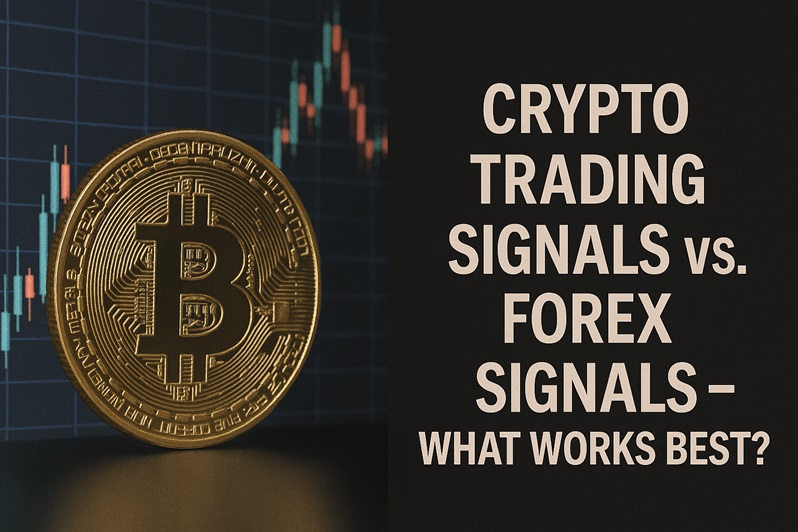
In the ever-evolving world of financial markets, trading signals have become an essential tool for both beginners and experienced traders. Whether in the crypto or Forex market, signals aim to provide actionable insights that help traders make informed decisions. But with the rise of cryptocurrencies, many are asking: which type of signal offers more value? Comparing crypto trading signals and Forex signals can help traders determine which suits their style, goals, and risk tolerance best.
Core Differences Between Crypto and Forex Signals
While both crypto and Forex signals serve the same basic function—providing guidance on potential trade entries and exits—they differ significantly in structure, source, and behavior. Forex signals are typically based on well-established technical and fundamental analyses. Since the Forex market is mature and highly liquid, signals tend to follow consistent patterns that respond predictably to macroeconomic events, central bank decisions, and global news.
Crypto signals, on the other hand, often include additional variables such as social sentiment, blockchain activity, or project developments. The crypto market operates 24/7, which means signals can emerge at any hour and may be affected by sudden announcements, influencer activity, or unexpected regulatory shifts. As a result, crypto signals may demand faster reaction times and greater flexibility.
Evaluating Signal Reliability and Performance
Forex signals generally have a long track record, with many providers offering verified historical results. The regulated nature of Forex markets and the stability of major currency pairs contribute to more consistent performance metrics. Signal accuracy can often be tested over several years, helping traders gauge their long-term effectiveness.
In contrast, crypto signal performance can be more volatile due to the market’s rapid changes and emerging nature. While some crypto signal providers leverage advanced AI and sentiment tracking tools, the unpredictability of the crypto space makes it harder to rely on historical performance alone. However, for traders who thrive in fast-paced environments, crypto signals may offer unique profit opportunities if managed correctly.
Additionally, execution plays a role in signal effectiveness. Forex brokers often provide advanced platforms with tight spreads and fast execution, enabling traders to act on signals with precision. In the crypto space, differences between exchanges, liquidity issues, and transaction fees can impact the outcome of signal-based trades.
Which Signals Work Best for Your Trading Style?
Choosing between crypto and Forex signals often depends on your preferred trading style and tolerance for risk. Forex signals may be more suitable for traders who value stability, regular trading hours, and proven technical patterns. These signals tend to align with traditional strategies like swing trading, scalping, and trend following.
Crypto signals appeal to traders who are open to higher risk and want exposure to a constantly evolving market. The potential for larger, quicker gains attracts those who enjoy speculative opportunities and are willing to monitor markets around the clock. Some traders even use both signal types to diversify their strategies and take advantage of different market conditions.
Ultimately, the best signals are the ones that match your trading objectives, risk appetite, and availability. Whether you’re focused on the traditional structure of Forex or the innovation of crypto, signals are most effective when integrated into a broader strategy that includes solid risk management and continuous learning.
Conclusion
Both crypto and Forex trading signals offer valuable insights, but they cater to different types of traders. Forex signals stand out for their consistency and structure, while crypto signals excel in dynamism and growth potential. The key to success lies not in choosing one over the other, but in understanding their nuances and applying them strategically. With the right approach, either can become a powerful component of your trading toolkit.
FAQs
Are crypto signals riskier than Forex signals?
Yes, crypto signals often involve higher volatility and less regulation, making them riskier but also potentially more rewarding.
Can I use both types of signals in one strategy?
Absolutely. Many traders use both to diversify their portfolios and take advantage of different market dynamics.
Are Forex signals more accurate than crypto signals?
Not necessarily, but they tend to be more stable due to the mature nature of the Forex market and long-standing analysis methods.
How can I verify a signal provider’s credibility?
Look for verified performance records, transparent trade history, and user reviews on trusted platforms.
Do I need different tools to trade based on crypto vs. Forex signals?
Yes, Forex typically requires a broker with MT4/MT5 or similar, while crypto signals often rely on exchange-based platforms or APIs.
